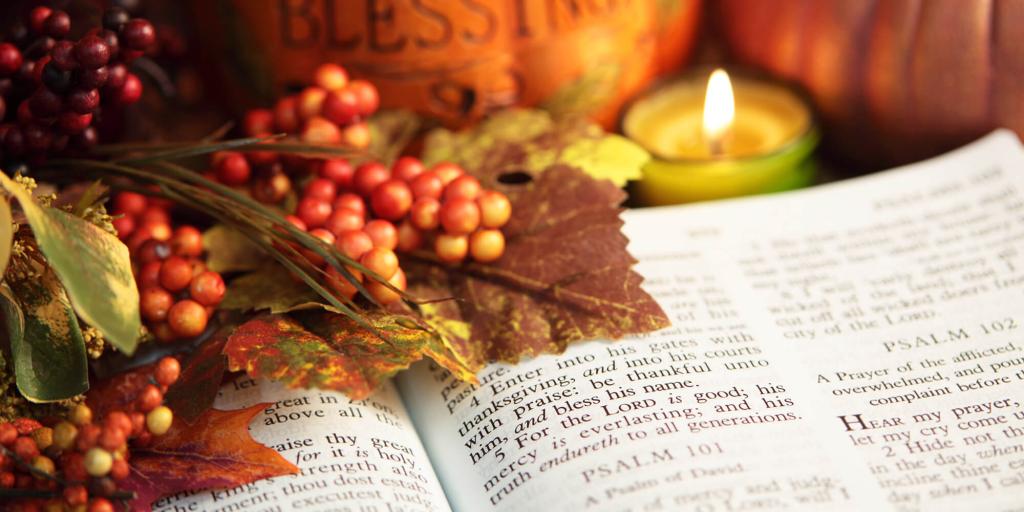
It’s Not About the Turkey
Do you have a pet peeve? You know, an irritation that rankles you but is relatively minor in the grand scheme of things? As Americans approach our national day of Thanksgiving, it irritates me when people flippantly refer to it as “Turkey Day.” It is so much more than a day for turkey, football, and all the trimmings! Now, these things are great traditions that I enjoy as much as the next person—but they should not overshadow the origins and the meaning of the occasion. When one considers the great bounty of physical blessings, including personal freedoms, that we enjoy in this country and much of the Western world—even in hard times—a profound pause to give thanks to the One who makes it possible should be the highest order of the day.
Many certainly remember the group known to history as the Pilgrims, who came to North America in 1620 seeking religious freedom and a better life and legacy. Their epic struggle with the winter weather, sickness, and disease, and their tenacity in pursuing their dream through it all, is legendary and inspirational. They paved the way in developing a new, raw land into the prosperous one we enjoy today. As they overcame adversity and expressed thankfulness to their Creator for His intervention and benevolence, they set a great example for us. Where do these blessings—another word for benefits—come from? James, the Lord Jesus’ brother, was inspired to put it this way: “Every good gift and every perfect gift is from above, and comes down from the Father of lights, with whom there is no variation or shadow of turning” (James 1:17).
With that in mind, what should our attitude be—not just on this day of Thanksgiving, but every day?
The Apostle Paul expressed it eloquently: “Rejoice always, pray without ceasing, in everything give thanks; for this is the will of God in Christ Jesus for you” (1 Thessalonians 5:16–18). David—shepherd, psalmist, and king—wrote this in Psalm 103:1–2: “Bless the Lord, O my soul; and all that is within me, bless His holy name! Bless the Lord, O my soul, and forget not all His benefits.” It’s plain to see why David was a man after God’s own heart (Acts 13:22).
President George Washington proclaimed a national day of Thanksgiving in 1789. Then, in 1864, Abraham Lincoln declared his desire for Thanksgiving Day to be observed on the last Thursday of every November. Lincoln eloquently proclaimed, “I, Abraham Lincoln, President of the United States, do hereby appoint and set apart the last Thursday in November next as a day which I desire to be observed by all my fellow-citizens, wherever they may then be, as a day of Thanksgiving and Praise to Almighty God, the beneficent Creator and Ruler of the Universe. And I do farther recommend to my fellow-citizens aforesaid that on that occasion they do reverently humble themselves in the dust and from thence offer up penitent and fervent prayers and supplications to the Great Disposer of Events for a return of the inestimable blessings of peace, union, and harmony throughout the land which it has pleased Him to assign as a dwelling place for ourselves and our posterity throughout all generations” (“Proclamation 118—Thanksgiving Day, 1864,” Presidency.ucsb.edu).
Mr. Lincoln’s prayerful proclamation for peace, union, and harmony in his troubled time certainly has great application to ours.
President Franklin D. Roosevelt officially made Thanksgiving a national holiday on November 26, 1941, after some controversy ensued from trying to move the date to one week earlier. It is a beloved day for families and feasting. Over time, the emphasis on thanking God for his beneficence has waned for many. Particularly in this time of multiple natural disasters, a global pandemic, and unprecedented political acrimony, a day of reflection and prayer—thanking God for His blessings and asking for mercy and guidance at a time we most desperately need it—will make Thanksgiving Day much more meaningful. It just may be that God will hear and answer the fervent prayers of the people if they approach Him in sincerity and truth.
Enjoy your turkey with family and friends, along with whatever other traditions you may have, but remember the purpose and theme of the day—it’s certainly not about the turkey.
You may find our study guide Twelve Keys to Answered Prayer and the Tomorrow’s World magazine article “Seven Steps to Happiness” particularly useful now and in your daily life. They are available, free of charge, at TomorrowsWorld.org.
Stay up to date with our Weekly Digest Email!
Tomorrow's World ComMentary Podcast
Subscribe to Tomorrow's World Commentary podcasts on iTunes and Google Play!



